KUALA LUMPUR, Oct 3 — Supporting Malaysia’s small and medium enterprises (SMEs) is vital as the global supply chains are shifting to Asean countries.
Investment, Trade And Industry Minister Tengku Datuk Seri Zafrul Abdul Aziz said Asean is, in fact, the new China and is set to become not just the world’s factory but also a significant consumer base.
The 10 nations comprising the bloc are already home to more than 678 million people, with a combined Gross Domestic Product (GDP) of about US$3.7 trillion (RM17.4 trillion) in 2022.
As a bloc, he said Asean is the fifth-largest economy in the world, with a middle class of roughly 350 million, representing US$300 billion (RM1.41 trillion) of disposable income.
Tengku Zafrul was speaking at the memorandum of understanding (MoU) exchange event between Malaysian Industrial Development Finance Bhd (MIDF) and Agensi Kaunseling dan Pengurusan Kredit (AKPK) to provide financial assistance through MIDF’s Second Chance Financing scheme (2CF).
He added that in 2022, when the global foreign direct investment (FDI) fell by 12 per cent, FDI into Asean went up by five per cent, and its share of global FDI rose to an all-time high of 17 per cent.
“In short, our own SMEs’ survival in local supply chains could help them to capitalise on not only Asean’s growing middle class but also shifting supply chains to and FDI flowing into this region.
“This regional economic integration is also a goal that is also espoused by the Madani Economy framework,” Tengku Zafrul said.
The government acknowledged the significant influence of external factors on businesses and recognised that even well-managed companies could suffer setbacks from circumstances beyond their control, especially in the ever-evolving economic landscape.
“Sudden shifts in market conditions, unforeseen disruptions, or internal struggles can push promising companies to the brink of failure and have far-reaching consequences for a production’s entire supply chain, encompassing suppliers, customers, employees and possibly the surrounding communities,” he said.
Providing these companies with a financial lifeline which supports their business recovery is crucial in ensuring that supply chains remain intact, which, in turn, is crucial to the nation’s socio-economic development.
“To that end, the MIDF – AKPK collaboration is an important, holistic recovery ecosystem in terms of supporting troubled companies, particularly the SMEs,” Tengku Zafrul said.
Opportunity for SMEs to secure financing
Meanwhile, MIDF Group’s chairman Tan Sri Abdul Rahman Mamat said the MIDF 2CF scheme offers financing between a minimum of RM50,000 to a maximum of RM5 million at a rate of three per cent annum on monthly rest, with a tenure of up to 10 years.
The scheme provides struggling SMEs an opportunity to secure equity and debt financing, especially in cases where they encounter challenges obtaining funding from traditional banks or other financial institutions.
This initiative extends financial assistance to companies seeking to acquire distressed businesses, and even those under AKPK are eligible to apply for the financing scheme.
“MIDF and AKPK have been actively exploring a potential partnership to facilitate greater access to this Second Chance Financing scheme for financially distressed SMEs.
“We aim to seamlessly integrate the 2CF scheme into the broader support framework provided by AKPK and MIDF. This ensures that financially distressed SMEs not only receive crucial financial assistance but also benefit from the expertise of AKPK in holistic debt rehabilitation,” he said.
In the 63 years since MIDF was established, it has approved RM17.5 billion worth of soft financing, which has benefited over 13,300 local companies.
“MIDF currently manages government funds amounting to RM3.5 billion and provides Shariah-based financing for projects, fixed assets, and working capital to Malaysian companies in all economic sectors,” Abdul Rahman said.
— Bernama





